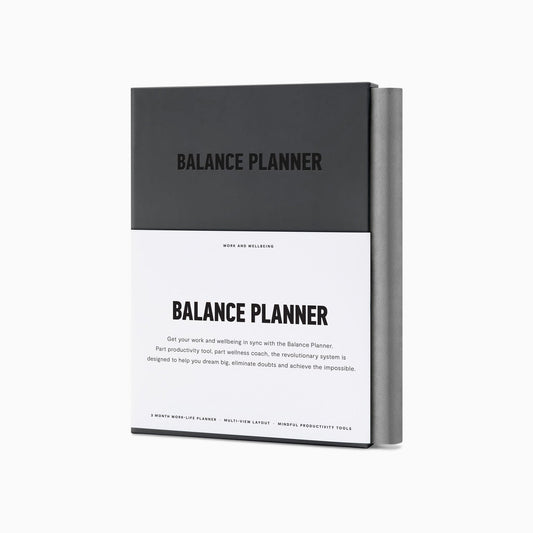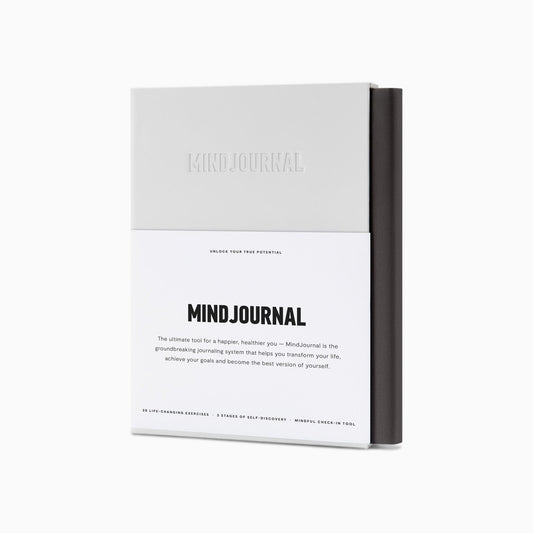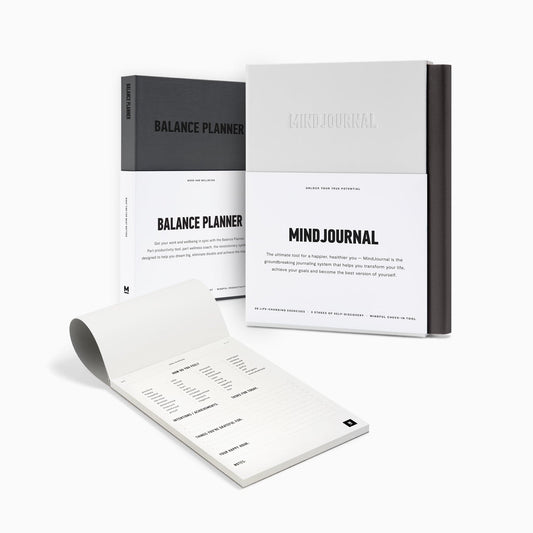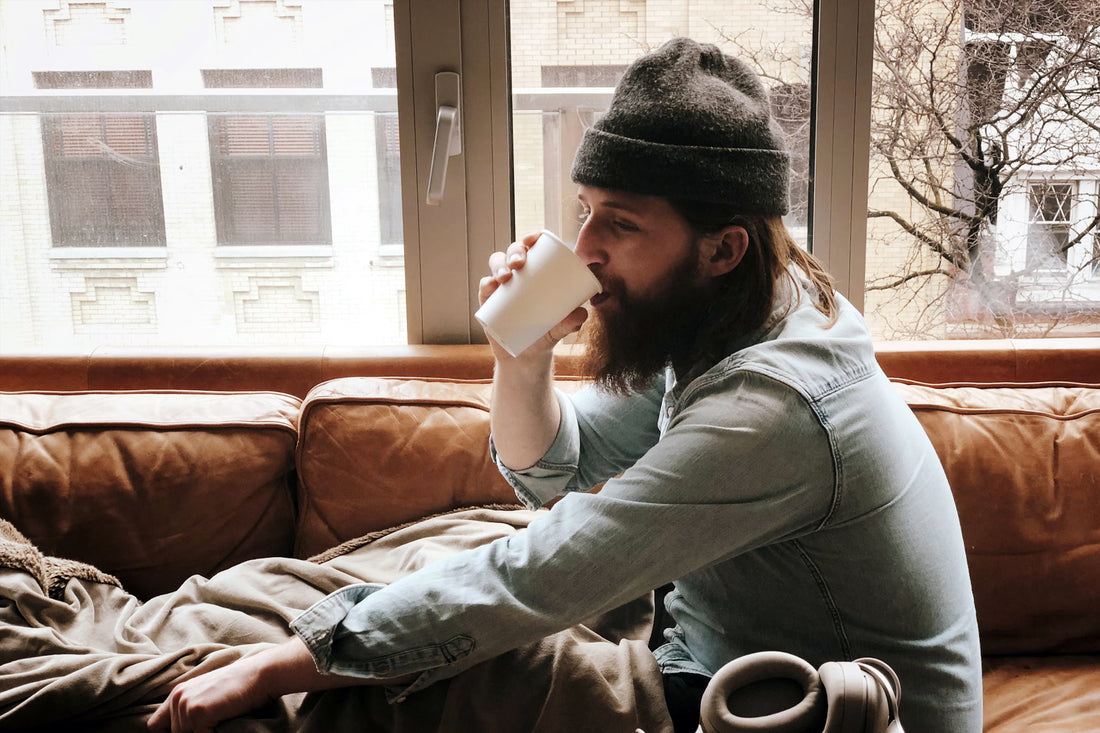Start your journey
Browse our bestsellers for a better you.
Frequently added:




by MindJournal - 9 min read

We all need sleep, but whether it's work, children or a busy social life, different demands on our time often mean that our eight hours can suffer.
But there are things you can do to give yourself the best chance at a rejuvenating sleep and having a productive, energetic morning.
Backed by science, these practical tips and strategies will help you transform your mornings (and nights) and kickstart your day with renewed drive and enthusiasm.
First things first - make it as easy as possible by prioritising a sleep routine.
A 2018 review of over 92,000 people's sleep habits found that "earlier sleep timing and regularity in sleep patterns with consistent bedtimes and wake-up times are favourably associated with health". In simpler terms, waking up at the same time daily signals your body to be alert. This consistency should also nudge you towards a consistent bedtime, strengthening a healthy sleep cycle.
Don't just focus on mornings. Make bedtime a wellness ritual, too.
A 2017 study on children showed that a consistent pre-sleep routine makes for a more complete, restful sleep, leaving participants waking up feeling energised. The same is true for adults.
Whether it's putting your mug in the dishwasher or walking the dog, having a pre-bed routine can help body and mind wind down, and focus on sleep.
Studies show forcing yourself out of bed at the first alarm and not hitting snooze for an extra 20 minutes is crucial for regulating your body's natural sleep-wake cycle (circadian rhythm). That precious extra sleep isn't as restorative and can leave you feeling groggier thanks to "sleep inertia."
Skipping the snooze button might even lower your risk of heart disease, making you feel energised in the morning and healthier overall.
If you struggle to wake up, it can be tempting to reach for an espresso. That's fine; just don't overdo it.
While coffee's health benefits are well-documented, downing too much in the morning can backfire. The surge can lead to a crash later, disrupting your sleep that night and making tomorrow's wake-up even harder.
One study even found that participants felt more tired the day after consuming caffeinated drinks, so maybe go decaf after your first cup?
It can be difficult to sleep with your to-do list swirling around in your head. Before you know it, it's morning, you've hardly slept, and you feel less than energised.
Nip this in the bud by writing down your worries, concerns, and anything else that's on your mind in your journal before bed, leaving your mind to dream.
Science shows that writing a to-do list can help ease chore-based anxiety and help us get to sleep quicker. On average, those who journaled before bed fell asleep nine minutes faster, giving them a head-start the next day.
Between sweating and breathing, we all lose water while we sleep. One study even found that we lose more water when we sleep less than eight hours a night.
This means that reaching for a cool glass of water is an ideal way to kick-start your day, especially as morning hydration improves alertness (something we could all do with).
And with regular water consumption proven to keep cognitive function at its highest throughout the day, why not start as you mean to go on?
It isn’t just drinking water first thing that can help, with a growing body of evidence suggesting that a splash of cold water may help support mood, wellbeing, and mental alertness.
Consider cold exposure—even a bit—the ideal way to get energised. Cold showers have also been found to reduce sick days, meaning you can stay fighting fit first thing and beyond.
Sometimes, you have to fake it until you make it, and there's nothing like getting the blood pumping first thing to trick your body into feeling alert.
Science shows that cool temperatures can ensure a restful night of sleep, but rapidly heating your body up can help energise you for the day.
In fact, some studies show that moderate to vigorous exercise in the morning can actually improve sleep quality the following night. So, not only will you feel energised during the day, but you'll also be setting yourself up for a restful night.
If you want to give yourself the best chance of those restful 8 hours, you can consider a range of things to optimise your environment, from blocking out light with blackout blinds or eye masks to silencing distractions with earplugs or a white noise machine.
Finally, ensure a comfortable temperature with a fan or adjust the thermostat. Between 15 and 20 degrees Celsius is considered the most comfortable temperature for sleep, but how warm or cold your bedroom is will come down to personal preference.
What you do during the day can impact how well you sleep and how energised you feel when you wake up.
According to a meta-review published in The Journal of Physiology, light is the “most potent stimulus” for regulating our circadian rhythm. In fact, the study authors note that variations in light can even suppress our production of the sleep hormone melatonin.
Experts recommend getting outside as often as possible or investing in Bright Light Therapy (such as a full-spectrum lamp at 10,000 lux) to mimic daylight conditions.
Getting up and out as soon as you wake up can seriously boost your serotonin levels, helping you feel energised even when you haven’t had the best night’s sleep.
It’s a knock-on effect, with the same study finding that boosted energy and happiness levels during the day led to better sleep at night.
What’s more, a study from the University of Rochester found that getting outside made people “feel more alive” – a great reason to spring out of bed.
We're big believers in napping, but if it makes falling asleep harder, you might want to rethink your schedule.
If you're set on keeping your nap time, try to limit the length of your snooze. Data from the National Institute of Health discovered that naps longer than 10 minutes can make us more sleepy upon waking.
Focus on a good balance. If naps affect your sleep, try swapping the time for a 10-minute walk instead.
A restorative state of mind before bed can help you drop off and wake up. At least, according to a 2019 study which found that meditation can improve sleep quality in those suffering from “sleep disturbances”.
Another published in JAMA Internal Medicine found that those who practised mindful awareness before bed reported a more restful night’s sleep. It’s even thought to improve insomnia long term.
-
Sleep isn't a luxury - it's a necessity. Just like food and air, sufficient sleep is crucial for your mental and physical health. It fuels your body's repair system, clears out toxins, and keeps your mind sharp. Prioritise your shut-eye, and watch your well-being soar.
MindJournal
£
35.00
Sale price
£
24.50
GBP
